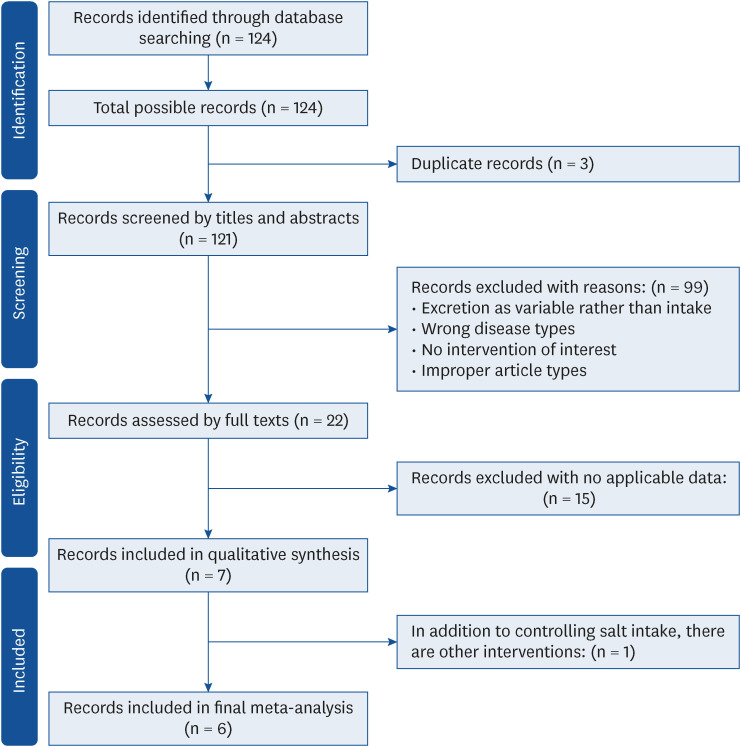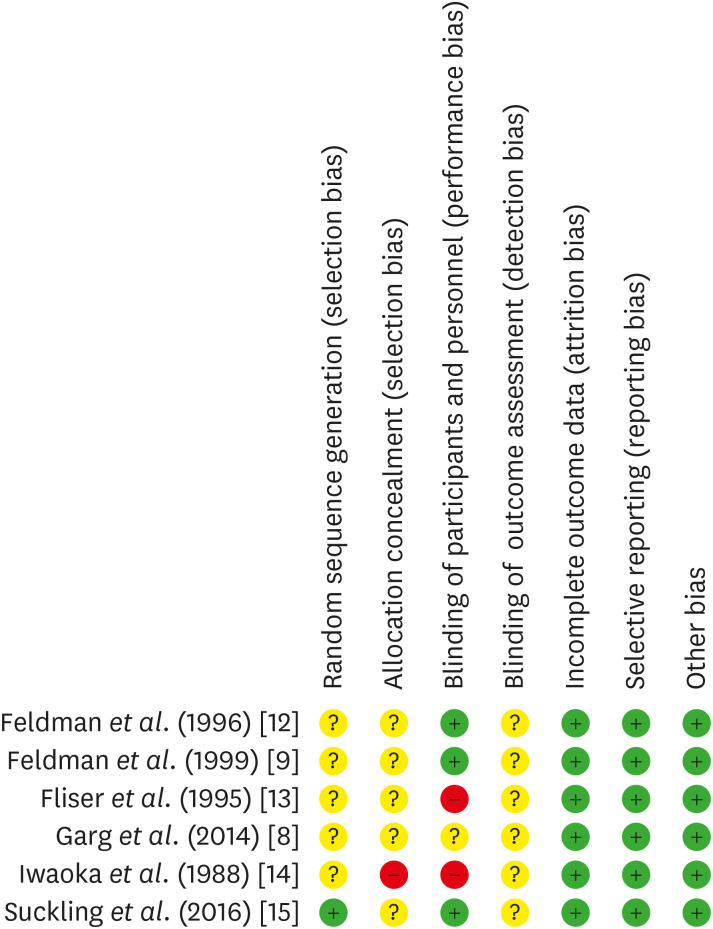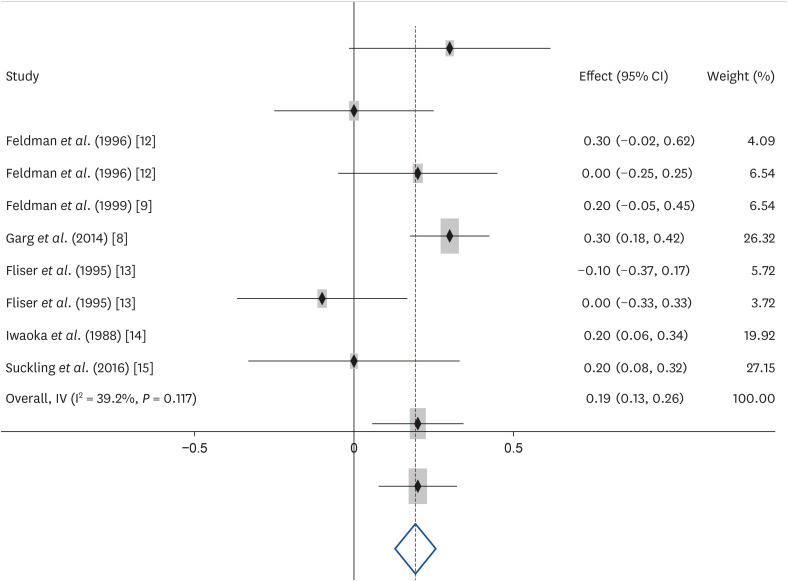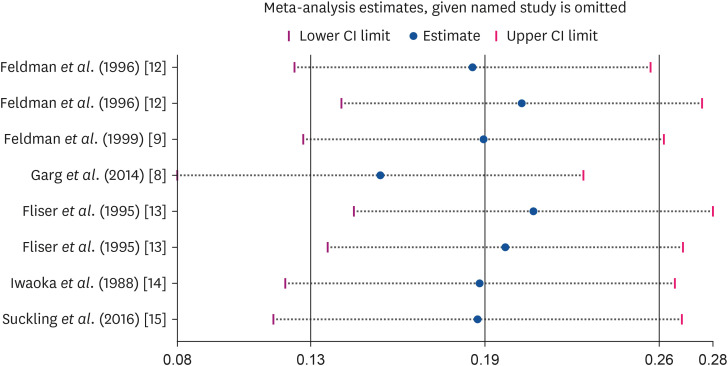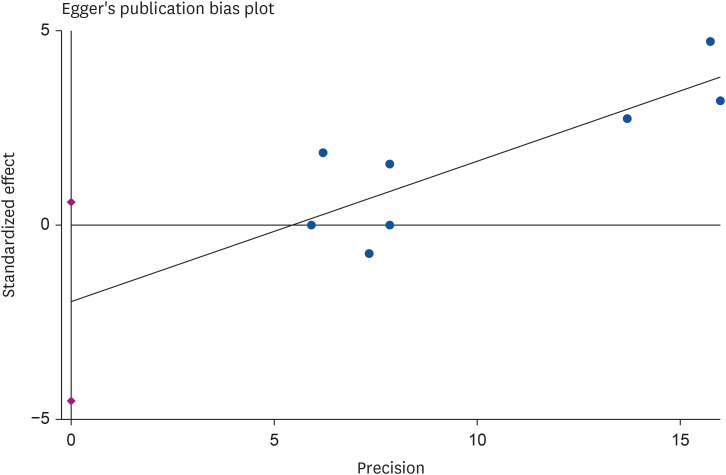Nutr Res Pract.
2023 Jun;17(3):387-396. 10.4162/nrp.2023.17.3.387.
Effects of dietary salt intake restriction on blood glucose levels: a meta-analysis of crossover study
- Affiliations
-
- 1Department of Information Retrieval, School of Public Health, Jilin University, Changchun 130021, China
- 2State Key Laboratory of Environment Health (Incubation), Key Laboratory of Environment and Health, Ministry of Education, Key Laboratory of Environment and Health (Wuhan), Ministry of Environmental Protection, School of Public Health, Tongji Medical College, Huazhong University of Science and Technology, Wuhan 430030, China
- 3Department of Occupational and Environmental Health, School of Public Health, Jilin University, Changchun 130021, China
- 4Department of Cell Biology, College of Basic Medicine, Jilin University, Changchun 130021, China
- KMID: 2542837
- DOI: http://doi.org/10.4162/nrp.2023.17.3.387
Abstract
- BACKGROUND/OBJECTIVES
To identify modifiable risk factors for type 2 diabetes mellitus and explore the relationship between diet sodium intake and blood glucose levels.
MATERIALS/METHODS
Based on inclusion and exclusion criteria, we extracted, analyzed, and assessed the available crossover studies of dietary salt intake restriction and insulin resistance in PubMed, Web of Science, MEDLINE, Embase, Wanfang, and CNKI databases.
RESULTS
We included 6 studies with 8 sets of data, covering 485 subjects. I2 statistics results showed insignificant heterogeneity among all data (I 2 = 39.2% < 50%). Thus, a fixed-effect model was adopted for the final pooled effect size. Weighted mean difference and its 95% confidence interval (CI) value was 0.193 (95% CI, 0.129–0.257), and the test of the overall effect showed P < 0.001. The results revealed that the blood glucose levels in the subjects in the low-salt intake group were significantly higher than those in the normal or high-salt intake groups. We also found no significant change occurred after the removal of any study through sensitivity analysis, which confirmed that the outcome we calculated was prudent and credible. The quantitative Egger’s test (P = 0.109 > 0.05) indicated that insignificant publication bias existed.
CONCLUSION
This meta-analysis highlights the relationship between dietary sodium intake and blood glucose levels. Our findings show that higher blood glucose levels might be expected in hypertensive or normal people with low-salt consumption compared to those with normal or high-salt consumption, although these differences were not clinically significant. Trial Registration: PROSPERO Identifier: CRD42021256998
Figure
Reference
-
1. Lin X, Xu Y, Pan X, Xu J, Ding Y, Sun X, Song X, Ren Y, Shan PF. Global, regional, and national burden and trend of diabetes in 195 countries and territories: an analysis from 1990 to 2025. Sci Rep. 2020; 10:14790. PMID: 32901098.2. Naser KA, Gruber A, Thomson GA. The emerging pandemic of obesity and diabetes: are we doing enough to prevent a disaster? Int J Clin Pract. 2006; 60:1093–1097. PMID: 16939551.3. Kannenkeril D, Karg MV, Bosch A, Ott C, Linz P, Nagel AM, Uder M, Schmieder RE. Tissue sodium content in patients with type 2 diabetes mellitus. J Diabetes Complications. 2019; 33:485–489. PMID: 31101486.4. Radzeviciene L, Ostrauskas R. Adding salt to meals as a risk factor of type 2 diabetes mellitus: a case-control study. Nutrients. 2017; 9:67. PMID: 28098780.5. Han S, Cheng D, Liu N, Kuang H. The relationship between diabetic risk factors, diabetic complications and salt intake. J Diabetes Complications. 2018; 32:531–537. PMID: 29534865.6. Premilovac D, Richards SM, Rattigan S, Keske MA. A vascular mechanism for high-sodium-induced insulin resistance in rats. Diabetologia. 2014; 57:2586–2595. PMID: 25212260.7. Kim MK. Dietary sodium intake in patients with type 2 diabetes mellitus. Diabetes Metab J. 2016; 40:280–282. PMID: 27550209.8. Garg R, Williams GH, Hurwitz S, Brown NJ, Hopkins PN, Adler GK. Low-salt diet increases insulin resistance in healthy subjects. Metabolism. 2011; 60:965–968. PMID: 21036373.9. Feldman RD, Schmidt ND. Moderate dietary salt restriction increases vascular and systemic insulin resistance. Am J Hypertens. 1999; 12:643–647. PMID: 10371376.10. Wellek S, Blettner M. On the proper use of the crossover design in clinical trials: part 18 of a series on evaluation of scientific publications. Dtsch Arztebl Int. 2012; 109:276–281. PMID: 22567063.11. Wang T, Malone J, Fu H, Heilmann C, Qu Y, Huster WJ. Crossover design and its application in late-phase diabetes studies. J Diabetes. 2016; 8:610–618. PMID: 27100270.12. Feldman RD, Logan AG, Schmidt ND. Dietary salt restriction increases vascular insulin resistance. Clin Pharmacol Ther. 1996; 60:444–451. PMID: 8873692.13. Fliser D, Fode P, Arnold U, Nowicki M, Kohl B, Ritz E. The effect of dietary salt on insulin sensitivity. Eur J Clin Invest. 1995; 25:39–43. PMID: 7705385.14. Iwaoka T, Umeda T, Ohno M, Inoue J, Naomi S, Sato T, Kawakami I. The effect of low and high NaCl diets on oral glucose tolerance. Klin Wochenschr. 1988; 66:724–728. PMID: 3050268.15. Suckling RJ, He FJ, Markandu ND, MacGregor GA. Modest salt reduction lowers blood pressure and albumin excretion in impaired glucose tolerance and type 2 diabetes mellitus: a randomized double-blind trial. Hypertension. 2016; 67:1189–1195. PMID: 27160199.16. Raji A, Williams GH, Jeunemaitre X, Hopkins PN, Hunt SC, Hollenberg NK, Seely EW. Insulin resistance in hypertensives: effect of salt sensitivity, renin status and sodium intake. J Hypertens. 2001; 19:99–105. PMID: 11204310.17. Townsend RR, Kapoor S, McFadden CB. Salt intake and insulin sensitivity in healthy human volunteers. Clin Sci (Lond). 2007; 113:141–148. PMID: 17425514.18. Gomi T, Shibuya Y, Sakurai J, Hirawa N, Hasegawa K, Ikeda T. Strict dietary sodium reduction worsens insulin sensitivity by increasing sympathetic nervous activity in patients with primary hypertension. Am J Hypertens. 1998; 11:1048–1055. PMID: 9752889.19. Oh H, Lee HY, Jun DW, Lee SM. Low salt diet and insulin resistance. Clin Nutr Res. 2016; 5:1–6. PMID: 26839871.20. Beaglehole R, Bonita R, Horton R, Adams C, Alleyne G, Asaria P, Baugh V, Bekedam H, Billo N, Casswell S, et al. Priority actions for the non-communicable disease crisis. Lancet. 2011; 377:1438–1447. PMID: 21474174.21. World Health Organization. Guideline: Sodium Intake for Adults and Children. Geneva: World Health Organization;2012.22. Lima NK, Tozetto DJ, Lima LG, Nobre F, Moriguti JC, Ferriolli E, Foss MC. Salt and insulin sensitivity after short and prolonged high salt intake in elderly subjects. Braz J Med Biol Res. 2009; 42:738–743. PMID: 19649400.23. Laws A, Reaven GM. Effect of physical activity on age-related glucose intolerance. Clin Geriatr Med. 1990; 6:849–863. PMID: 2224751.24. Shamshirgaran SM, Mamaghanian A, Aliasgarzadeh A, Aiminisani N, Iranparvar-Alamdari M, Ataie J. Age differences in diabetes-related complications and glycemic control. BMC Endocr Disord. 2017; 17:25. PMID: 28472985.25. Abdullah MF, Sidi H, Ravindran A, Gosse PJ, Kaunismaa ES, Mainland RL, Mustafa N, Hatta NH, Arnawati P, Zulkifli AY, et al. How much do we know about the biopsychosocial predictors of glycaemic control? Age and clinical factors predict glycaemic control, but psychological factors do not. J Diabetes Res. 2020; 2020:2654208. PMID: 32455131.26. Vasdev S, Gill VD, Parai S, Gadag V. Effect of moderately high dietary salt and lipoic acid on blood pressure in Wistar-Kyoto rats. Exp Clin Cardiol. 2007; 12:77–81. PMID: 18650986.27. Alderman MH. Evidence relating dietary sodium to cardiovascular disease. J Am Coll Nutr. 2006; 25:256S–261S. PMID: 16772637.28. He FJ, Li J, Macgregor GA. Effect of longer term modest salt reduction on blood pressure: Cochrane systematic review and meta-analysis of randomised trials. BMJ. 2013; 346:f1325. PMID: 23558162.
- Full Text Links
- Actions
-
Cited
- CITED
-
- Close
- Share
- Similar articles
-
- Dietary Salt Intake and Hypertension
- Self-monitoring urinary salt excretion device can be used for controlling hypertension for developing countries
- Dietary Salt and Potassium Intake and Hypertension
- Not Salt Taste Perception but Self-Reported Salt Eating Habit Predicts Actual Salt Intake
- Barriers in Salt Reduction Strategies: Time to Acting for the Future

